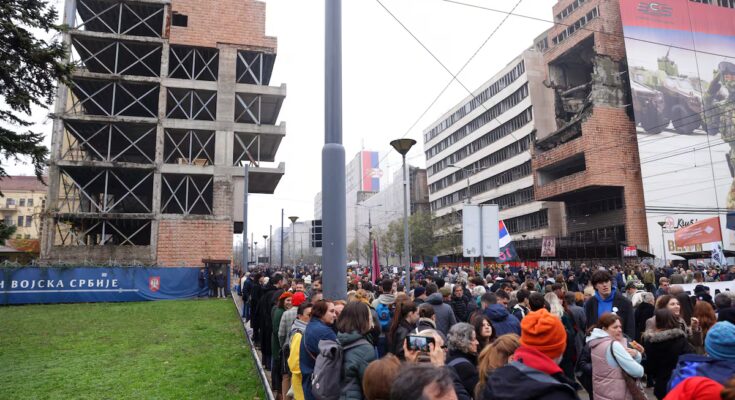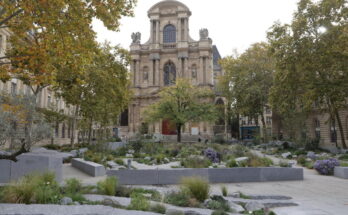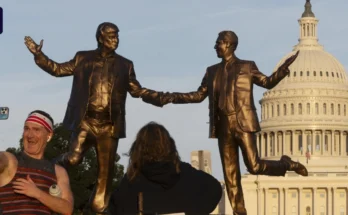President Donald Trump’s son-in-law Jared Kushner, who is married to his daughter Ivanka, posted a tweet on March 15, 2024 in which he confessed: “I am excited to share some preliminary images for the development projects we have created for the Albanian coast and downtown Belgrade.” Another user replied to his message: “Not in Belgrade! Those buildings are protected by law as historical heritage and we will in no way allow you to build those skyscrapers.” The headquarters of the General Staff, known as Generalstab, is located on the land Kushner plans to invest in. The building was bombed by NATO in 1999, next to the adjacent Ministry of Defence.
The government of Serbian President Aleksandar Vucic and his formation, the Serbian Progressive Party (SNS, for its acronym in Serbian) stripped the Generalstab of the protection of cultural property on November 14, 2024, just nine days after Trump’s re-election. The opposition claimed that the documents presented to adopt this measure were false and the case is being investigated by the Organized Crime Prosecutor’s Office. But last Friday the Serbian Parliament approved the a lex specialis (special law) to speed up operational procedures. The government imposed a parliamentary majority on the SNS and its allies to implement the law.
Kushner already has the law on his side. But for more than a year, an important part of Serbian society has maintained its opposition to the project. The latest demonstration of refusal brought together thousands of citizens in front of the Generalstab this Tuesday.
The Generalstab complex, built between 1957 and 1965 by architect Nikola Dobrovic, is considered a masterpiece of Yugoslavian modernism and has enjoyed official protection as a historic heritage site since 2005. Kushner’s company, Affinity Partners, plans to build a luxury hotel, 1,500 residential units and a museum on the land, Trump’s son-in-law revealed last year The New York Times. Last May, Serbia’s Ministry of Construction, Transport and Infrastructure issued a statement stressing that the land is leased for 99 years (not sold) and that the investor must build a memorial to NATO victims. The statement does not reveal the amount of the transaction, even if the New York Times estimates it will be $500 million.
Serbian architect Miljan Salata witnessed protests in front of the Generalstab several times. And he explains from Belgrade, via video call, that the international media tend to focus exclusively on the memory of the 1999 NATO bombings and on anti-Nato sentiment. “But that’s only a small part of the puzzle,” he objects.
Miljan Salata claims that the property is located in an area where the main state institutions were located “more than 200 years ago”. He adds that the block, built during the Socialist Republic of Yugoslavia, symbolizes the anti-fascist struggle of the partisans during World War II. And he frames the opposition to this real estate operation within the protests that Serbian students began a year ago after the collapse of a roof at the Novi Sad train station. That tragedy, in which 16 people died, was seen by protesters as a consequence of the corruption that is corroding the country.
Salata explains that this year in Serbia students gave more than 50 conferences on the value of the Generalstab. “They want the building to be rebuilt as a public good that represents an attempt at reconciliation with the past. To accept their own and others’ mistakes and move forward as a society,” he emphasizes.
Salata believes this case is also a warning for the European Union, where Donald Trump Jr. and Jared Kushner “plan to build eight towers,” according to the architect. The activist insists that the fight is not “anti-Trump” or “anti-NATO”, but rather for people’s right to decide on their own urban space.
Repression of protests
The controversy over the building is worsening at a time when President Vucic is going through his worst moment, after 13 years in power. On the one hand, the students are calling for early elections. Last month the European Parliament issued a harsh resolution warning of crackdowns on protests and a lack of freedom. President Trump, however, applied 35% tariffs on Serbian products. And he ordered sanctions against the Russian-owned oil company NIS, the main supplier of oil to Serbia.
This newspaper attempted unsuccessfully to contact MP Milenko Jovanov, who was in charge of defending the project in the Serbian Parliament last Friday. During the debate, Jovanov said: “We are opening spaces and creating opportunities for the country to move forward. Will this lead to improved relations with the Trump administration, with the United States? Honestly, I would like it to be that way.”
Journalist Zeljko Veljkovic, who works for United Media, the main independent media critical of the government, indicates via WhatsApp that the real estate operation is due to a “desperate move” by Vucic to get closer to Trump, “after he had not met with him in Florida a few months ago”.
Opposition MP Peda Mitrovic, general secretary of the Freedom and Justice Party, claims via email that the Serbian president is trying to use this project to “present himself as a reformist modernizer, amid domestic criticism and that of the European Union.”
MP Biljana Djordjevic, co-president of the Green-Left party, specifies in a video conference that the agreement “is not with the United States, but with Trump and his family”. For the MP, the government’s narrative tries to reduce the debate to the existence of “two ruined buildings that have stood for 25 years and represent a security danger”, but warns that the root of the problem is another: “This is the administrative, political and cultural center of Belgrade; it cannot be handed over to private capital.”
The parliamentarian adds that the operation also concerns other historic buildings, “still protected”, which are located within the Generalstab. The MP supports the restoration of the buildings: “Even if their reconstruction were economically unfeasible, they should at least be used for public, not private, use.”
Estela Randinjic Zivkov, chief conservator of the Institute for the Protection of Cultural Monuments of Serbia, in an exchange of messages indicates that the building is a symbol of national memory and “a unique synthesis of architecture and urbanism”. And he claims that the government’s decision to withdraw protection of the complex is illegal. “There is an ongoing criminal investigation into the falsification of documentation used to justify the decision. Until the conclusion of this process, any new decision based on this act is illegal.”



